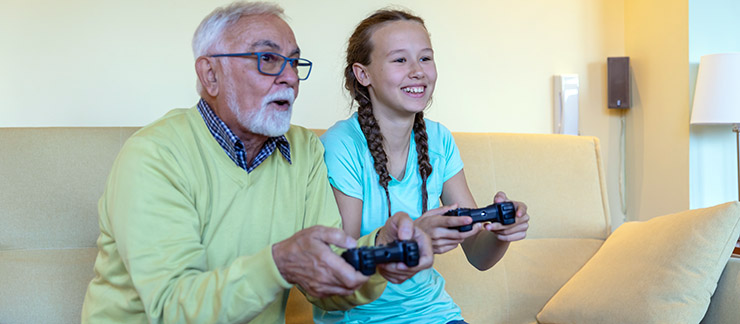10 Realistic Ways to Manage Caregiver Stress
Caring for a loved one can be an overwhelming task resulting in stress. The emotional and physical demands can lead to anxiety, depression, isolation and, unfortunately even resentment. These feelings can be common when providing care for a loved one.
Conversely, providing loving care does have its rewards. Caregivers are compassionate, patient, attentive, dependable and trustworthy; attributes that enable them to thrive with seniors in need of living assistance.
If you are feeling guilty, numb, angry, irritable or exhausted, caregiver stress may be the culprit.
Alleviating this stress is vital, both for you and the person you’re providing care. Unfortunately, fatigue-related mistakes, even by well-intentioned caregivers, can be fatal. It’s important, too, to protect your existing relationship, prior to the care — whether it’s parent and child, husband and wife or otherwise. Caregiving provides family members with a wide array of highs and lows that can change in a moment’s time or over the course of care needed. The one element that can never be replaced is our relationship with our family. If you are caring for your mom or dad, you are always that person’s daughter or son. Use these 10 tips to help you steer clear of caregiver stress, keep your loved one safe and protect (or restore) that loving relationship while keeping your peace of mind:
- Watch what you eat. Regular nutritious meals provide your body with the fuel it needs to accomplish daily tasks. Stress can weaken the immune system. Healthy eating helps keep your defenses up against illness. Consider meal delivery services that will send you a box with healthy recipes and all the ingredients you need — or some services even prep the full meal for you.
- Exercise. Commit to some type of physical activity daily. Moving your body will buoy your spirits and improve your stamina. It can improve your sleep, which is often disrupted by anxiety, depression and stress, according to the Mayo Clinic. Remember: Even just a brisk walk around the block counts.
- Lean on friends and family. When neighbors, friends or family members offer help or to bring dinner over, accept it. Dismiss pride or guilt. There are consequences of caregiver stress and burnout, and they unfortunately affect your loved one. Family and friends want to help. Let them.
- Hire a home care service. A home care professional can help create a customized plan based on your loved one’s needs, personality and preferences. The care plan can include a range of services — from bathing and grooming, to meal prep, grocery shopping, medication reminders and more.Care is flexible, and professional help for even two hours at a time can significantly reduce your stress levels.
- Take a break. You are the most qualified person to offer your loved one care. You also need and deserve downtime. Respite care can help if you plan to be out — whether it’s a few hours, a day or even a vacation. For people with a specialized need, like dementia care, professional elderly companionship or home care services can be ideal. Bottom line: You deserve a break and there are resources to help you get one.
- Consider your mental & spiritual health. Be mindful of your mental & spiritual health. A well-timed massage or manicure is not only physically relaxing, it will provide you with a mental break too. Setting aside even 10 minutes a few mornings a week to drink a cup of coffee, read a book, pray or meditate (there are popular meditation and/or prayer apps available for free download) can center your mental state.
- Realize you’re not alone. Caring for someone around the clock can be isolating. Maintaining a social life is important to your emotional well-being. Schedule weekly calls to friends or family, or seek support groups for people in your situation so you can learn from other’s experiences. You can meet people in your local community who share your interests via a website like MeetUp.com. Join Facebook groups to meet other people and combat social isolation — whether it’s groups of other caregivers, groups based on your interests or groups based in your community. You are not alone.
- Talk it over. Caregiver resentment can come from feeling undervalued or taken for granted. It may also help to talk with a trusted friend, counselor or a geriatric social worker, especially if your loved one is not able to converse with you. Conversation can be therapeutic.
- Manage your money. Few things exacerbate stress more than financial worries. The good news that is you don’t have to be good with money to manage it properly. Download a free personal finance app like Mint and, at the very least, let that track your spending. This lets you easily keep track of your money situation while allowing you to remain focused on your loved one.
- Get your rest. Sleep is vital to good health. Stress disrupts sleep, especially if the demands of caring for your loved one extend to the evening. Even a slight sleep deprivation can affect memory, judgment, mood, and contribute to obesity and high blood pressure. If you can’t stick to a regular sleep schedule, it may be time to look for overnight help. A professional caregiver is available to help 24/7.
Mayo Clinic: https://www.mayoclinic.org/healthy-lifestyle/stress-management/in-depth/caregiver-stress/art-20044784
American Stroke Association https://www.stroke.org/
National Institute of Health: https://stroke.nih.gov/
American Psychological Association: https://www.apa.org/index.aspx













